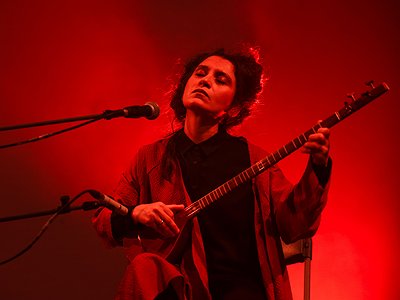Name: Elshan Ghasimi
Nationality: Iranian
Occupation: Composer, tar player
Recommendations: Book: Shahnameh; Painting: Siamak Filizadeh's artwork
If you enjoyed this Elshan Ghasimi interview and would like to keep up to date with her music, visit her official homepage.
When I listen to music, I see shapes, objects and colours. What happens in your body when you're listening? Do you listen with your eyes open or closed?
I listen to music with my eyes sometimes open and sometimes closed.
I can't explain in words what happens! depending on the music, every time is special and different!
What were your very first steps in music like and how would you rate the gains made through experience - can one train/learn being an artist?
My first steps in music were connected with a lot of rhythmic experiments as a child!
As far as training or learning to be an artist is concerned: yes and no! Both!
According to scientific studies, we make our deepest and most incisive musical experiences between the ages of 13-16. What did music mean to you at that age and what’s changed since then?
Memorable musical experiences are happening on a daily basis for me!
What did music mean to you at that age and what has changed since then?
I am speechless!
Where does the impulse to create something come from for you? What role do often-quoted sources of inspiration like dreams, other forms of art, personal relationships, politics etc play?
Literature
Are you acting out certain roles or parts of your personality in your music which you couldn't or wouldn't in your daily life? If so, which are these? If not, what, would you say, are the key ideas behind your approach to music?
This is more of a reflection of the inner/outer world, which is a unified whole.
Music is a language, but like any language, it can lead to misunderstandings. In which way has your own work – or the work of artists you like or admire - been misunderstood? How do you deal with this?
So far, I have not been confronted with it.
Making music, in the beginning, is often playful and about discovery. How do you retain a sense of playfulness as things become more professionalised and how do you still draw surprises from equipment, instruments, approaches and formats you may be very familiar with?
Fortunately, or unfortunately, I had a hard classical music education for more than 25 years.
In this way, discipline and joy have been moving in parallel for me all the time.
Sound, song, and rhythm are all around us, from animal noises to the waves of the ocean. What, if any, are some of the most moving experiences you've had with these non-human-made sounds? In how far would you describe them as “musical”?
What is being explained in this question is perhaps a real piece of music :)
How does the way you make music reflect the way you live your life? Can we learn lessons about life by understanding music on a deeper level?
Music could be a reflection of life, but not necessarily.
In terms of understanding life, I think it depends on many details, points that move in parallel through life, not specifically through a deep understanding of music.
We can surround us with sound every second of the day. The great pianist Glenn Gould even considered this the ultimate delight. How do you see that yourself and what importance does silence hold? What role do headphones play for you in this regard?
Silence!
How much we need it these days …
How much we need to become aware of it in music …
I don't use headphones!
Do you feel as though writing or performing a piece of music is inherently different from something like making a great cup of coffee?
No! It could be the same :)
What do you express through music that you couldn't or wouldn't in more 'mundane' tasks?
Words and literature without frontiers!
If you could make a wish for the future – what are developments in music, you would like to see and hear?
I am not thinking about the future. I live in the present.




